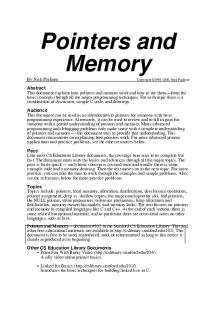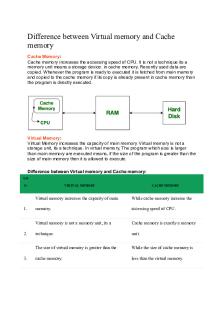Lecture 15 Learning and Memory PDF

| Title | Lecture 15 Learning and Memory |
|---|---|
| Course | Fundamental Neuroanatomy |
| Institution | University of Lethbridge |
| Pages | 4 |
| File Size | 286.7 KB |
| File Type | |
| Total Downloads | 59 |
| Total Views | 150 |
Summary
Brain disorders lecture notes, broken down....
Description
Lecture 15: Learning and Memory: ⏤ What Memory is…. - Experience shapes us, changing our brains and our behaviour - What Memory for? - The details of everyday life - Holding information for short time while we work on it - Remebering the events of our lives - Capturing patterns of co-occurrence - Helps us to use the past to imagine the future ⏤ Three Keys functions…. - Encoding → Transforming what we perceive, think, feel into memory - Storage/ Consolidation → Maintaining info over time - Retrieval → Bringing information to mind that has been stored
⏤ How Memory encoding works…. - Encoding: - Transforming perceptions into memories (see,hear…) - Several types: - Semantic encoding (meaning) - Visual imagery encoding (visual info, tricks) - Organizational encoding - Semantic Encoding: (Frontal lobe) - Relating new info to knowledge that is already stored in memory
- Involves left inferior frontal lobe and inner part of left temporal lobe Visual Imagery Encoding: (Occipital lobe) - Process of storing new information by converting it into mental pictures - Activate visual processing regions in the occipital lobe - Organizational Encoding: (Frontal lobe) - Process of Categorizing info according to relationships among a series of items - Involves the upper surface of the left frontal lobe ⏤ What memory consolidation is and how it works…. - Process of maintaining information in memory over time - Three major kinds of memory storage: - Sensory Storage → Holds sensory info for a few seconds or less - Short - term memory → Holds nonsensory info for more than a few seconds but less than a minute - Long - term storage → Holds info for hours, days, weeks, or years - Sensory Memory: - Iconic memory → Fast - decaying store of visual information - About 100 ms, large amount of information (9-12 items)(1 sec max) - Echoic Memory → Fast - decaying store of auditory information - About 3-4 seconds, large amount of informations= - Short - Term Memory: - About 7 items for 15-20 seconds - Rehearsal → Process of keeping info in memory by mentally repeating it. - Chunking → Combining small pieces of info into larger chunks -
-
Long - Term Memory: - Holds information for hours, days, weeks, or years. - No Capacity limits - Dependent on hippocampus - Declarative memory - Requires consolidation → Process by which memories become stable in the brain.
-
The Hippocampus: - Information from many different brain regions converges on the entorhinal cortex - From there the information enters the hippocampus - Travels unidirectionally through subfields of the hippocampus before exiting - Back to the entorhinal cortex - To other brain regions ⏤ The parts of the brain involved in Aphasia/Amnesia…. - Wernicke's area, located in the cerebral cortex, is the part of the brain involved in understanding written and spoken language. Damage to this area results in receptive aphasia (also called Wernicke's aphasia). - Hippocampal damage and amnesia: - Amnesia results from extensive damage to: - Hippocampus, Dentate gyrus, Subiculum, Amygdala, Neighboring Parahippocampal area
-
-
Anterograde Amnesia: - Deficit in learning new information after the onset of amnesia - Virtually always occurs in association with at least some retrograde amnesia. Retrograde Amnesia:
-
Amnesia can be temporally limited to less than an hour in cases in mild to closed head injury to several years in patients who receive electroconvulsive treatment (ECT) to decades in cases of Alzheimer’s disease. - The greater the damage to hippocampal regions, the greater the length of retrograde amnesia. - Typically, Retrograde amnesia is characterzied by temporal gradient - There is greater compromise of more recent memories than more remote memories. - This effect is often referred to as Ribot’s Law - Gradients of retrograde amnesia suggest that the memory may undergo a process of consolidation during the time after learning. ⏤ The process of Memory Retrieval…. - Process of remeber info stored in long - term memory - Two main types: - Recall, Recognition - Retrieval isn’t always perfect - ‘ Tip - of - the - tongue’ phenomenon - Successful recall reiles on hippocampus - Trying to recall relies on frontal lobe...
Similar Free PDFs

Lecture 15 Learning and Memory
- 4 Pages

Chapter 3 Learning and Memory
- 20 Pages

Topic 5 Learning Memory
- 13 Pages

Memory lecture notes
- 2 Pages

Lecture 7 Human Memory
- 12 Pages

Pointers And Memory
- 31 Pages

Notes - Memory and Cognition
- 146 Pages

Pointers And Memory
- 31 Pages
Popular Institutions
- Tinajero National High School - Annex
- Politeknik Caltex Riau
- Yokohama City University
- SGT University
- University of Al-Qadisiyah
- Divine Word College of Vigan
- Techniek College Rotterdam
- Universidade de Santiago
- Universiti Teknologi MARA Cawangan Johor Kampus Pasir Gudang
- Poltekkes Kemenkes Yogyakarta
- Baguio City National High School
- Colegio san marcos
- preparatoria uno
- Centro de Bachillerato Tecnológico Industrial y de Servicios No. 107
- Dalian Maritime University
- Quang Trung Secondary School
- Colegio Tecnológico en Informática
- Corporación Regional de Educación Superior
- Grupo CEDVA
- Dar Al Uloom University
- Centro de Estudios Preuniversitarios de la Universidad Nacional de Ingeniería
- 上智大学
- Aakash International School, Nuna Majara
- San Felipe Neri Catholic School
- Kang Chiao International School - New Taipei City
- Misamis Occidental National High School
- Institución Educativa Escuela Normal Juan Ladrilleros
- Kolehiyo ng Pantukan
- Batanes State College
- Instituto Continental
- Sekolah Menengah Kejuruan Kesehatan Kaltara (Tarakan)
- Colegio de La Inmaculada Concepcion - Cebu







